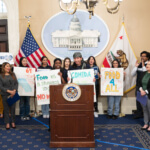Youth leadership is key to build an inclusive, healthy and just food system. Photojournalist Rucha Chitnis captures the vital voices and perspectives of immigrant and refugee youth in San Diego on improving the health and well being of their communities.
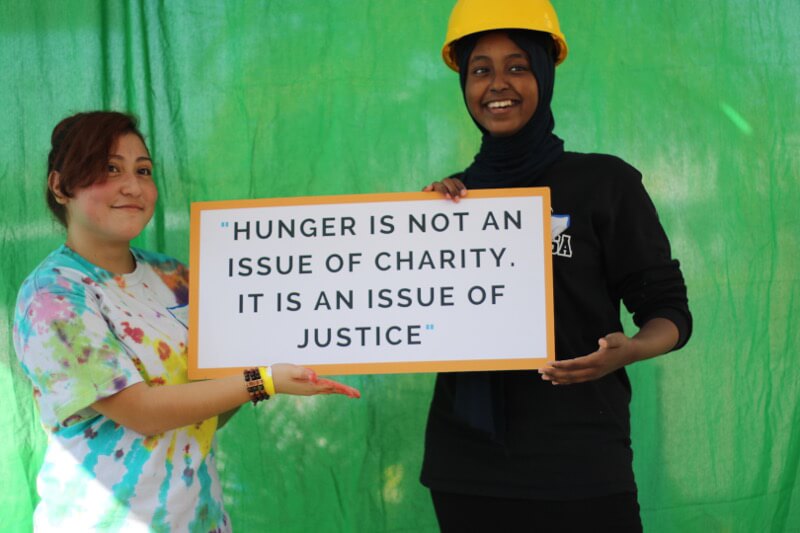
Noun Abdelaziz recalls being in the fifth grade when she had to fill out onerous applications to qualify for free meals in her school. “My parents did not speak English, and I had to work on the paperwork,” she explains. Noun, now 17, arrived in the U.S. on asylum as a refugee from war-torn Sudan after spending years in a refugee camp in Egypt. Last year, Noun gave a brave testimony to senators in California and urged them to back SB 138, “Count Me In for School Meals Act.” SB 138, a bill that was sponsored by California Food Policy Advocates (CFPA), mitigates child hunger by removing hassles of school meal program enrollment. The bill passed unanimously last year in September and will provide all students free meals in schools that have high poverty levels. “SB 138 allowed me to be a part of the change. Even though I will graduate soon, other students won’t have to deal with the stigma in their schools around school meals,” she said.
“Noun’s leadership on SB 138 proves that advocacy works,” said George Manalo-LeClair, Executive Director of the CFPA. “At a time when many people question whether policy progress can be made during these divisive political times, Noun shows us that change is possible.”
Noun is part of a youth-driven advocacy program called the Youth Advisory Council at the Center for Community Health. This pioneering program at University of California at San Diego is founded by Amina Sheik Mohamed to engage compassionate youth voices from refugee and immigrant communities to advocate for a healthy food system for their communities.
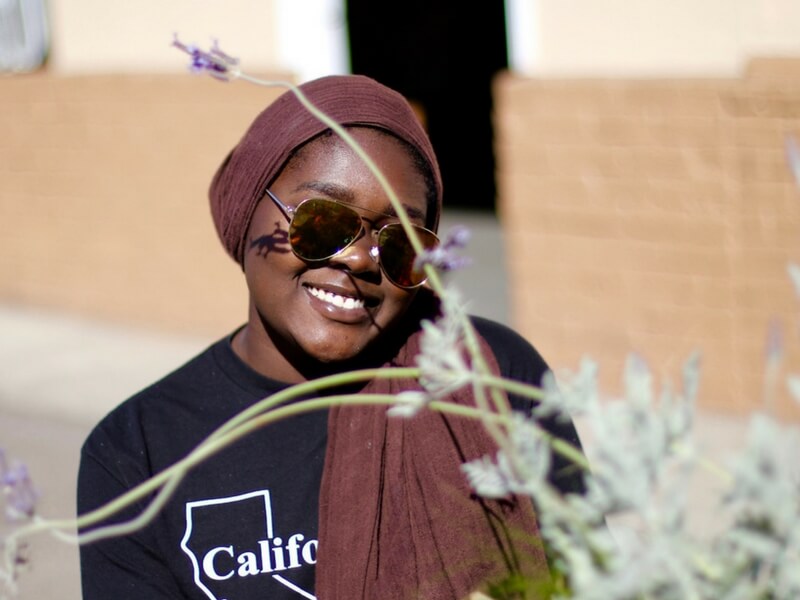 “Youth do make a difference, and we have powerful voices. If you give us an opportunity to change our community, we are 100% down,” said Noun Abdelaziz, who gave a testimony to California senators to reduce barriers for children to sign up for free school meals.
“Youth do make a difference, and we have powerful voices. If you give us an opportunity to change our community, we are 100% down,” said Noun Abdelaziz, who gave a testimony to California senators to reduce barriers for children to sign up for free school meals.
Amina, a Somali woman, arrived in the U.S as a refugee nearly 20 years ago. “Coming to the U.S., I was surprised to see people dying of chronic diseases. I realized I wanted to work on prevention and saw that people had many barriers to access or afford healthy foods,” she said. Many low income neighborhoods, like El Cajon, are rife with liquor stores with limited access to affordable fresh fruits and vegetables. Amina also observed that refugee youth were playing critical roles in their families, from English translation to navigating paperwork for accessing vital resources, like CalFresh, a food stamps program in California. “Talking to youth you realize they are so much more than high school students. They want to change their future, whether it is poverty conditions, better education or better employment,” she said.
In December last year, the YAC youth team participated in a placemaking program in the El Cajon neighborhood in San Diego, considered to be one of the most ethnically diverse community in the region El Cajon is also home to many refugees from North Africa and the Middle East, who have escaped war and persecution. As part of the placemaking activities, youth advocates from diverse immigrant communities gathered to revamp a grocery store called Rema Halal, whose owner is an Iraqi refugee. The activities included painting the store, designing art motifs for the walls, setting up bike racks and adding storefront signs. “The youth are doing so much. I hope this helps my business,” said Alaa al-Sadoon, owner of Rema Halal.
A Ghanaian musician, Nana Obrafo Yaw Asiedu, led a drum circle for community members. “Many refugees arrive here with trauma and eating unhealthy foods can increase the trauma,” said Dilkhwaz Ahmed, a Kurdish refugee, who is the executive director of License to Freedom, a nonprofit in El Cajon that offers services to refugees and immigrants, as well as survivors of domestic violence. “This is the safe, healing space that refugees need. There’s drumming. People are talking…We have to love them. We have to hug them, and listen to their needs to create healthy communities,” she said.
“The stories of Amina, Noun, and others must be heard,” said Manalo-LeClair. “Investing in leadership development will help ensure that these stories can compel others to take action and voice their vital perspective.” Heeding the call of youth, CFPA is raising resources for the “Food4All Leadership Institute.” The Institute hopes to bring together people and communities with a lived experience with hunger to share their personal stories, visions for solutions, and raise their voices to shift policy to guarantee #Food4All. Learn more here.
 El Cajon is among the most ethnically diverse communities in San Diego, which has also become home to refugees from war-torn regions in North Africa and Middle East
El Cajon is among the most ethnically diverse communities in San Diego, which has also become home to refugees from war-torn regions in North Africa and Middle East
 The Youth Advisory Council (YAC) members assert that hunger is an issue of justice in low-income neighborhoods and make a call to increase access to affordable fresh fruits and vegetables
The Youth Advisory Council (YAC) members assert that hunger is an issue of justice in low-income neighborhoods and make a call to increase access to affordable fresh fruits and vegetables
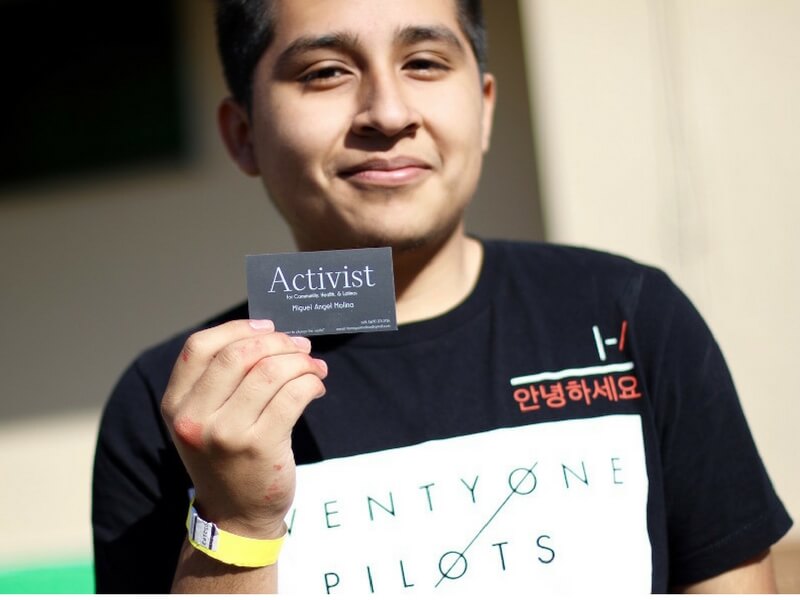 “It’s very important for youth to get our voices out because it’s mostly adults who make decisions for us, and they don’t really ask youth what we want,” said Miguel Angel Molina, a member of Youth Advisory Council (YAC) and a senior at Kearny High School.
“It’s very important for youth to get our voices out because it’s mostly adults who make decisions for us, and they don’t really ask youth what we want,” said Miguel Angel Molina, a member of Youth Advisory Council (YAC) and a senior at Kearny High School.
 “My mom always tells me if you can’t be part of the change, you can’t expect to see change. And of course, why wouldn’t I want to help myself? That’s why I joined YAC,” said Suad Abdi, 15. (Left to Right: Oriana, Suad, Siham)
“My mom always tells me if you can’t be part of the change, you can’t expect to see change. And of course, why wouldn’t I want to help myself? That’s why I joined YAC,” said Suad Abdi, 15. (Left to Right: Oriana, Suad, Siham)
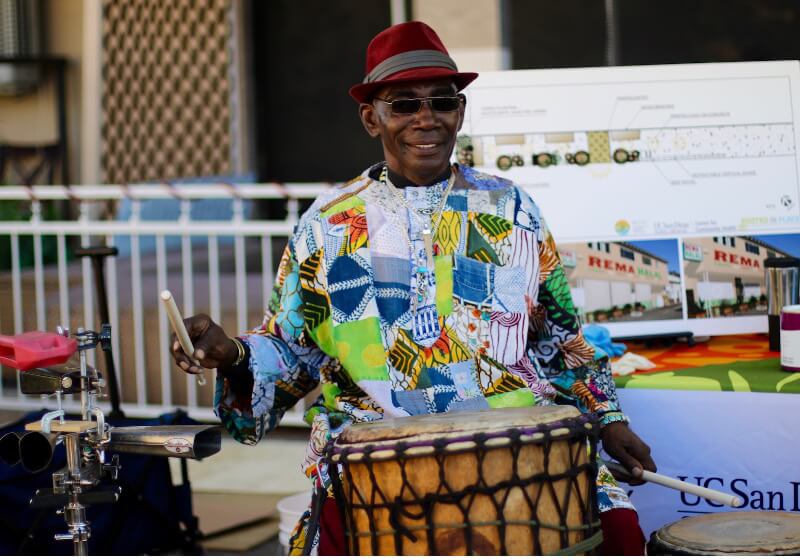 Nana Yaw Asiedu, a teacher of African culture, leads a drum circle for El Cajon community members.
Nana Yaw Asiedu, a teacher of African culture, leads a drum circle for El Cajon community members.
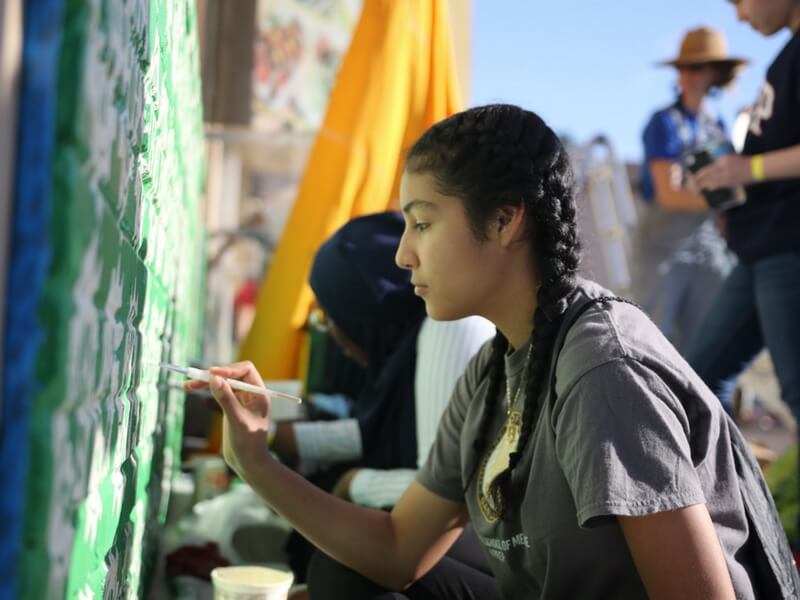 “Youth identify the underlying issues of hunger. Very often, they will say in order to end hunger in our community, we need to discuss safety, our environment. They are really identifying not the manifestations of hunger, but the root causes themselves,” observed Elizabeth Cooper, Program Coordinator at Center for Community Health.
“Youth identify the underlying issues of hunger. Very often, they will say in order to end hunger in our community, we need to discuss safety, our environment. They are really identifying not the manifestations of hunger, but the root causes themselves,” observed Elizabeth Cooper, Program Coordinator at Center for Community Health.
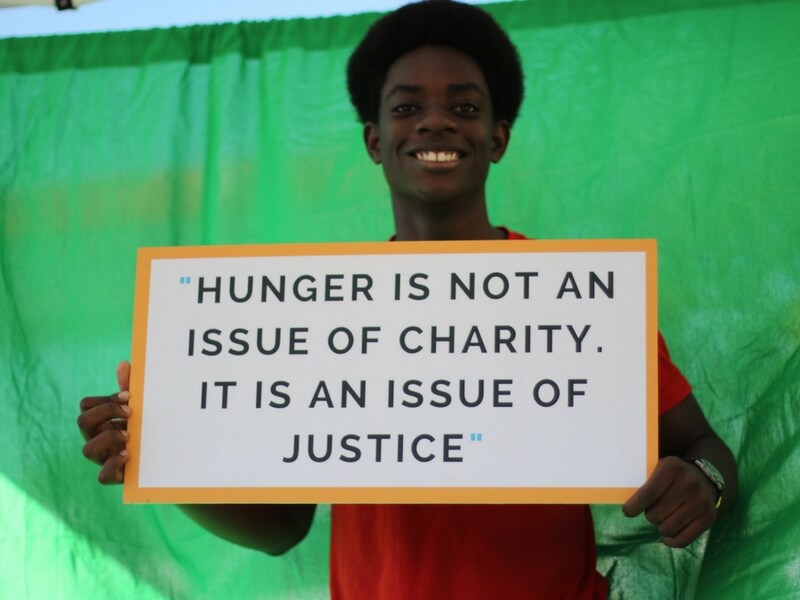 “I would regulate the number of fast food restaurants in certain neighborhoods. I don’t see enough farmers markets in my community. I would try to increase access to healthy foods,” said Elijah Sowunmi, a junior at Scripps High School.
“I would regulate the number of fast food restaurants in certain neighborhoods. I don’t see enough farmers markets in my community. I would try to increase access to healthy foods,” said Elijah Sowunmi, a junior at Scripps High School.
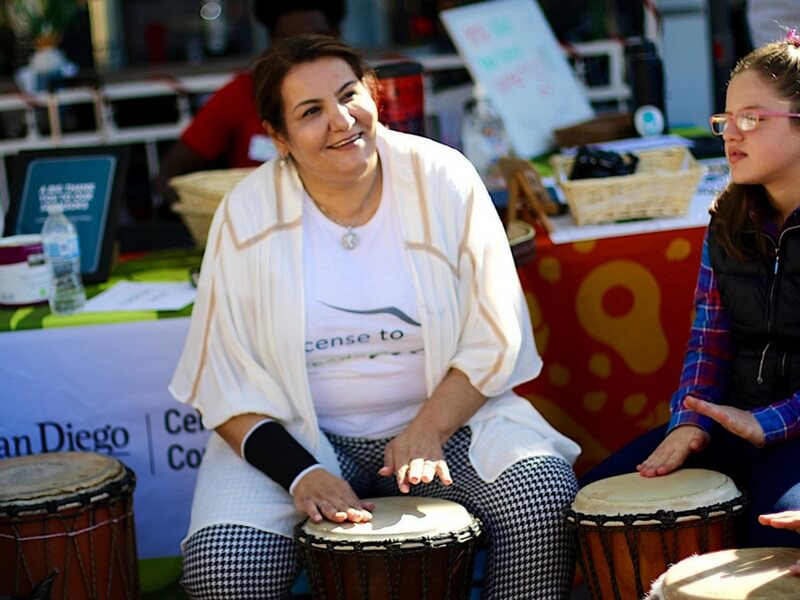 “We bring stories of the strength and resilience of refugees. They want to thrive, and they need your support. We change people’s opinions and perceptions about them,” said Dilkhwaz Ahmed, a Kurdish refugee, who is the executive director of License to Freedom.
“We bring stories of the strength and resilience of refugees. They want to thrive, and they need your support. We change people’s opinions and perceptions about them,” said Dilkhwaz Ahmed, a Kurdish refugee, who is the executive director of License to Freedom.
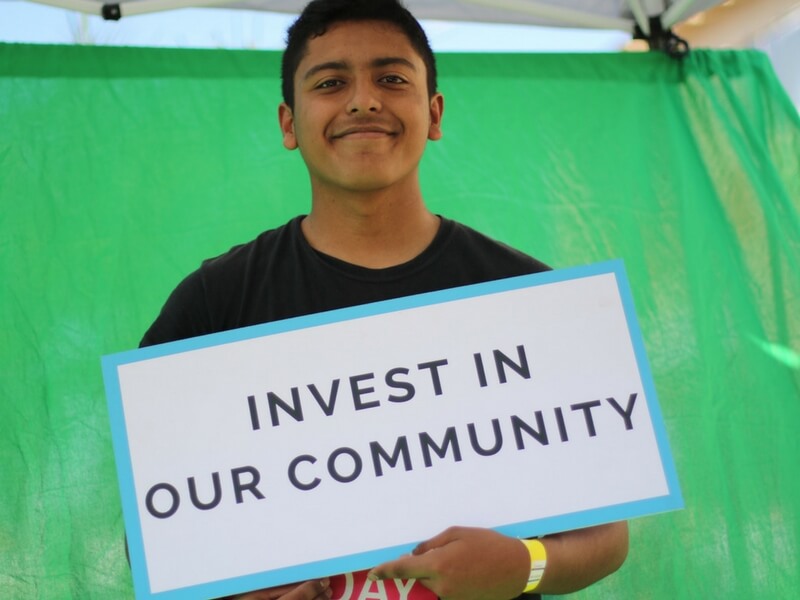 “A lot of politicians are afraid to fail. I want to show that everything is possible. Instead of being closed minded, youth can take an idea and build on from other people, not just ourselves,” said Alfredo Rivera, 17, from Kearney High School.
“A lot of politicians are afraid to fail. I want to show that everything is possible. Instead of being closed minded, youth can take an idea and build on from other people, not just ourselves,” said Alfredo Rivera, 17, from Kearney High School.
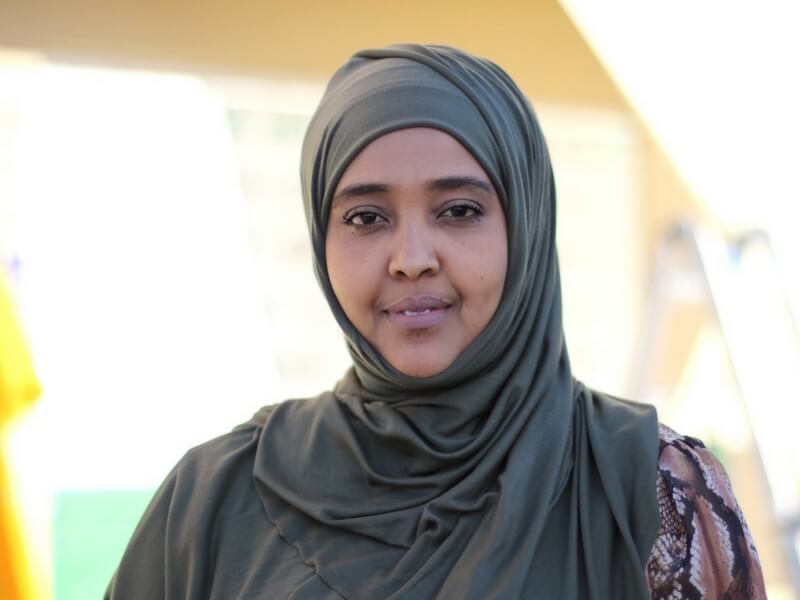 Amina believes it’s critical to understand the importance of culture in immigrant communities. She shared how some immigrant students weren’t eating free meals provided in schools, because the meat was not halal or kosher. “The youth advocated for halal foods and now schools in San Diego are offering it,” she said.
Amina believes it’s critical to understand the importance of culture in immigrant communities. She shared how some immigrant students weren’t eating free meals provided in schools, because the meat was not halal or kosher. “The youth advocated for halal foods and now schools in San Diego are offering it,” she said.
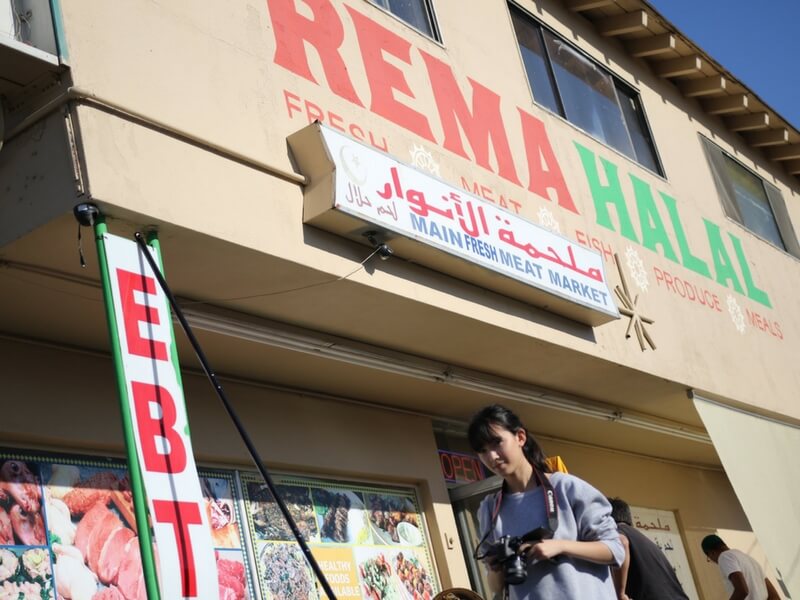 Alaa al-Sadoon, owner of Rema Halal, shared that the refugee community in El Cajon come to his grocery store for multiple reasons, besides buying food. “They ask us advice about doctors, rent and where to buy car,” he said. Alaa observed that majority of his customers use EBT cards or food stamps to afford food for their families.
Alaa al-Sadoon, owner of Rema Halal, shared that the refugee community in El Cajon come to his grocery store for multiple reasons, besides buying food. “They ask us advice about doctors, rent and where to buy car,” he said. Alaa observed that majority of his customers use EBT cards or food stamps to afford food for their families.
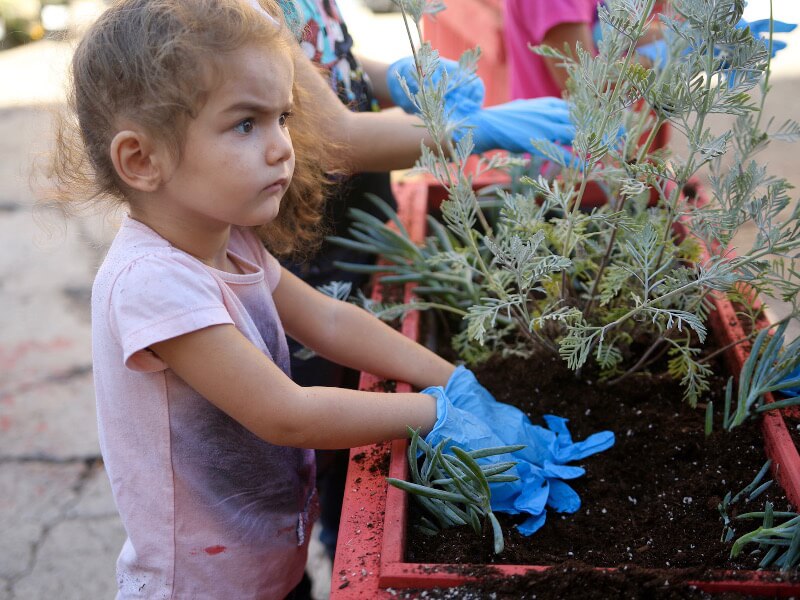 Children lend their support for the placemaking gathering at Rema Halal by planting ornamental plants.
Children lend their support for the placemaking gathering at Rema Halal by planting ornamental plants.



